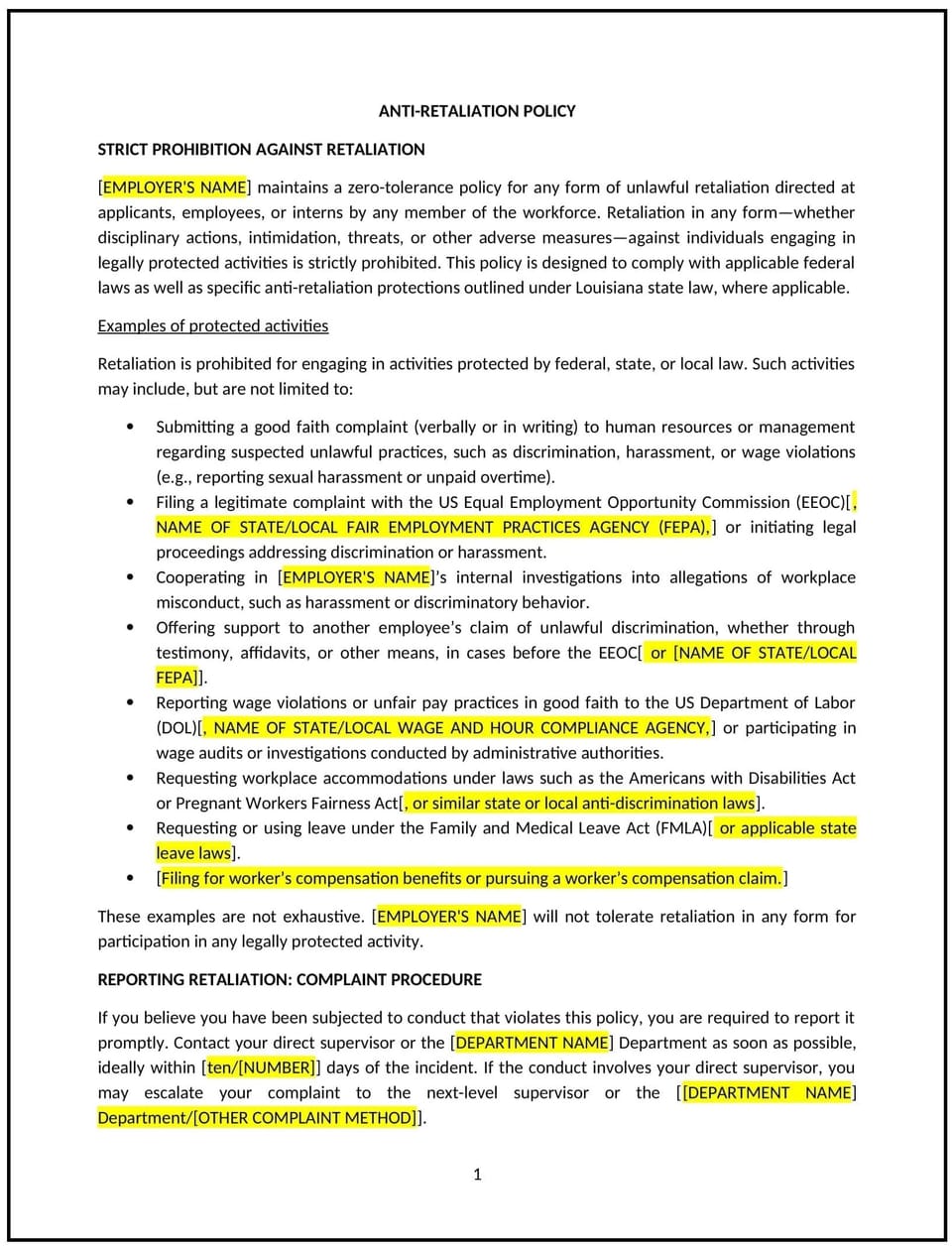Anti-retaliation policy (Louisiana): Free template

Anti-retaliation policy (Louisiana)
This anti-retaliation policy is designed to help Louisiana businesses protect employees who report misconduct, discrimination, or other workplace issues. It outlines safeguards against retaliation and promotes a culture of transparency and accountability.
By implementing this policy, businesses can encourage employees to voice concerns without fear of negative consequences, fostering a fair and supportive work environment.
How to use this anti-retaliation policy (Louisiana)
- Define retaliation: Clearly explain what constitutes retaliation, such as adverse actions against employees who report issues or participate in investigations.
- Establish reporting channels: Provide accessible and confidential methods for employees to report concerns or retaliation incidents.
- Communicate employee rights: Ensure employees understand their right to report misconduct and the protections in place under Louisiana law.
- Outline investigation protocols: Detail how retaliation complaints will be investigated promptly and impartially.
- Set consequences for violations: Specify disciplinary actions for individuals found to have engaged in retaliation.
- Include training requirements: Provide regular training to managers and employees on recognizing and preventing retaliation in the workplace.
Benefits of using an anti-retaliation policy (Louisiana)
Implementing this policy offers several advantages for Louisiana businesses:
- Protects whistleblowers: Safeguards employees who report issues, ensuring they feel secure in coming forward.
- Reduces legal risks: Minimizes the potential for lawsuits or claims related to retaliation.
- Promotes accountability: Encourages ethical behavior and transparency within the organization.
- Builds trust: Creates an environment where employees feel confident reporting concerns.
- Supports compliance: Aligns with Louisiana laws protecting employees from retaliation.
Tips for using this anti-retaliation policy (Louisiana)
- Clearly define retaliation: Ensure employees understand what actions are considered retaliatory behavior.
- Foster open communication: Promote a workplace culture that values transparency and encourages reporting of concerns.
- Train managers and leaders: Educate supervisors on preventing retaliation and responding to employee concerns appropriately.
- Monitor closely: Regularly assess workplace interactions to identify and address potential retaliation issues early.
- Update as needed: Review and revise the policy to reflect changes in Louisiana laws or organizational needs.
Q: What is considered retaliation under this policy?
A: Retaliation includes any adverse action, such as termination, demotion, or harassment, against an employee who reports workplace misconduct or participates in an investigation.
Q: How can employees report retaliation?
A: Employees can report retaliation through established reporting channels, such as HR, a confidential hotline, or their supervisor.
Q: Are businesses required to investigate retaliation complaints?
A: Yes, businesses should investigate all complaints promptly and impartially to address and resolve issues effectively.
Q: What training is recommended for employees?
A: Employees should receive training on recognizing retaliation, their rights under Louisiana law, and the company’s reporting procedures.
Q: How often should this policy be reviewed?
A: The policy should be reviewed annually or whenever there are updates to Louisiana laws or workplace practices regarding retaliation.
Q: What steps can businesses take to prevent retaliation?
A: Businesses can establish clear reporting procedures, train employees, monitor workplace interactions, and enforce strict consequences for retaliatory actions.
Q: Can retaliation claims lead to legal consequences for businesses?
A: Yes, businesses may face penalties or lawsuits if found to have allowed or engaged in retaliatory behavior.
This article contains general legal information and does not contain legal advice. Cobrief is not a law firm or a substitute for an attorney or law firm. The law is complex and changes often. For legal advice, please ask a lawyer.


